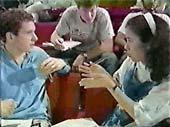Peer Instruction
Understanding or Memorization: Are we Teaching the Right Thing?,
at
Teaching Science Seminar, Dartmouth College (Hanover, NH),
Thursday, February 15, 1996
Assessment: The silent killer of learning,
at
EduTECH 2015 K-12 Congress (Brisbane, Australia),
Tuesday, June 2, 2015:
Flipping the Math classroom: How to turn your students' worlds right-side up ,
at
New Jersey City University (Jersey City, NJ),
Friday, February 1, 2013:
Comprensión o Memorización: ¿Estamos haciendo lo correcto?,
at
FUNGLODE (Santo Domingo, Dominican Republic),
Friday, April 15, 2011:
Confessions of a converted lecturer,
at
President's Teaching Series Lecture, Northwestern University (Evanston, IL),
Thursday, November 17, 2005:
Understanding or Memorization: Are we Teaching the Right Thing?,
at
Physics Seminar, University of Washington (Seattle, WA),
Saturday, May 1, 1993
Creating the ultimate flipped classroom - A step by step guide for Peer Instruction,
at
The Digital Education Show Middle East (Dubai, United Arab Emirates),
Monday, September 14, 2015:
Memorization or understanding: are we teaching the right thing?,
at
OCPA7, Sun Yat-sen University (Kaohsiung, Taiwan),
Thursday, August 4, 2011:
Peer Instruction: Successes and challenges,
at
Math & Science Partnership of Greater Philadelphia, Bryn Mawr (Bryn Mawr, PA),
Tuesday, April 17, 2007:
Peer Instuction: Stimulating Renewed Interest in Physics and Other Engineering Courses,
at
NSF Project Impact: Disseminating Innovation in Undergraduate Education (Arlington, VA),
Wednesday, June 1, 1994
Des Questions aux Concepts,
at
Turning Technologies User Conference: Conférences sur la pédagogie inversée, Université Nice Sophia Antipolis (Nice, France),
Friday, December 11, 2015:
Flipping the Classroom 201,
at
ATL Summer Teaching Institute, NC AT & T State University (Greensboro, NC),
Monday, May 13, 2013:
Confessions of a converted lecturer,
at
Faculty of Engineering & Physical Sciences Learning & Teaching event, University of Surrey (Guildford, UK),
Wednesday, October 26, 2011:
Confessions of a converted lecturer,
at
CEGEP John Abbott College (Montreal, Canada),
Wednesday, January 16, 2008:
 Peer Instruction actively engages the students in their own learning. Carefully chosen questions (ConcepTests give students the opportunity to discover and correct their misunderstandings of the material, and, in the process, learn the key ideas of physics from one another.
Peer Instruction actively engages the students in their own learning. Carefully chosen questions (ConcepTests give students the opportunity to discover and correct their misunderstandings of the material, and, in the process, learn the key ideas of physics from one another.